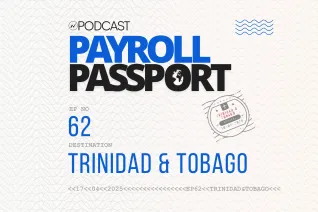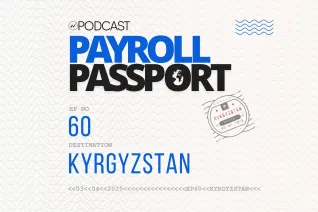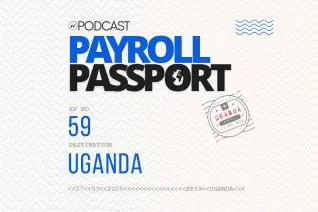Country Spotlight: Employer of Record in Sweden

Imagine owning a passport so powerful that you can enter 193 destinations without a visa. Boasting of an incredibly powerful passport is but one of the many things citizens of one of the world’s oldest sovereign nations have to boast about.
Sweden.
The country also has one of Europe's highest rates of entrepreneurship per capita and birthed global brands like IKEA, Spotify, and Volvo. It paints a picture of a driven workforce and upcoming business opportunities, making it an ideal destination for your global expansion plans.
However, hiring in a country without a legal entity can be daunting. While an Employer of Record (EOR) solution can ease this process, it is still advisable for employers to stay updated on the hiring requirements and employment in Sweden to ensure compliance.
Clocking in: Leaves and Work Hours in Sweden
The standard full-time work week in Sweden is 40 hours per week. Anything beyond that is considered overtime, which has limitations by law on how much can be required -
- No more than 48 hours over a period of four weeks,
- 50 hours in one month, or
- 200 hours annually.
The Swedes believe maintaining a healthy work-life balance is crucial to a happy workforce. So, their leave policies aim to "make it easier to combine career with family life."
Swedish employment laws entitle parents to a combined paid parental leave of 480 days (240 days per parent) at childbirth or adoption.
Maternity leave of 14 weeks is a part of this 480-day entitlement, while male employees can avail of 10 days of partially paid paternity leave apart from the 480 days.
If the child is born in 2016 or later, each parent has 90 days reserved exclusively for them. While these 90 days are included in the 240 days each parent receives, the benefits for taking these leaves will depend on their income and the division of leave days. Parents can take the minimum benefit (180 SEK per day) only when 180 sickness benefit qualifying days have been used for the child.
There are also provisions to take days off to care for a sick child. Parents with children under 12 can get compensated through the Swedish Social Insurance Agency (Försäkringskassan). The majority of Sweden's healthcare, including childbirth, is tax-subsidized.
LIVE WEBINAR ALERT I Beyond Compliance: Time Tracking’s Role in Shaping Europe’s Future Workforce
The Employment Protection Act (EPA)
In Sweden, the EPA is crucial for regulating employment in both public and private sectors, with some exceptions like household employees and upper secondary apprentices. It lays down other crucial guidelines concerning employment contracts, notice periods, and probationary periods.
Types of Employment Contracts:
Two types of contracts are popular in Sweden: Indefinite and fixed-term.
Fixed-term contracts can only be used for employment arrangements lasting up to two years, such as in cases where someone is needed for a specific project or to cover for someone on long-term leave (sickness or maternity), after which the contract is either renewed or switched to indefinite.
The legal requirements differ according to the type of contract. This can result in challenges when organizations have to take care of their employees in Sweden. A reliable EOR provider can ensure smooth and hassle-free hiring operations.
Learn more about Swedish employment and Payroll | Global Guide: Sweden
Social Security Contributions:
Both employers and employees contribute to the social security system, which funds various social benefits like healthcare, parental leave, pensions, and more.
Swedish and foreign employers with a permanent establishment (PE) in Sweden must contribute 31.42% of the total taxable remuneration (no cap) in cash and kind paid to the employee. Employers without a permanent establishment in Sweden pay a reduced rate of 19.8%.
Employees contribute 7% of their gross earned income up to a maximum of SEK 599,250 (approximately USD 56,000) towards their pension. However, this fee is usually fully tax-deductible, meaning it effectively has no cost for the employee on their tax return.
Notice Periods:
One of the key provisions of the Act pertains to notice periods, which vary based on the duration of employment. Employees with less than two years of service are entitled to a one-month notice period. This period extends to two months for employees with two to four years of service. Moreover, the notice period increases by an additional month every two years of employment, reaching a maximum of six months.
Also Read | Future-Proof your Workforce: Top 10 Global Work Trends for 2024
Probationary Period in Sweden:
The EPA allows for a probationary period of up to six months. The employer or the employee cannot extend it. If the employment continues beyond the probationary period without termination, it automatically transitions into indefinite employment.
However, under certain circumstances, provisions of this Act can be overridden by Collective Bargaining Agreements.
Collective Bargaining Agreements
These are written employment contracts that lay down the terms between an employer-representative organization or an employer and a union organization. They may also regulate other conditions between employers and employees.
It involves trade union density, adjusted bargaining coverage, and employer organization density, impacting wage setting, coordination, and working conditions for employees, ensuring fair representation and labor standards.
Collective bargaining holds the power to override select provisions of the EPA. However, it requires the approval of a central employee organization, typically a national-level trade union within the respective sector.
Only certain sections of the EPA may be overridden by collective bargaining agreements, such as termination, probation periods, temporary layoffs, and re-employment rights, following which the alternative agreement set in place will solely be determined by the terms of collective bargaining.
Additionally, agreements can establish alternative methods for calculating benefits outlined in Section 12 of the EPA.
Navigating through the Swedish employment landscape
Swedish Labor Laws may seem hazy and give you the chills. However, partnering with an EOR provider, like Neeyamo, can lift this haze and walk you through employment in Sweden seamlessly.
Our Global Work solution, powered by our Native Global Payroll Tech Stack, ensures that all your global expansion needs, including working hours, absence, payroll tax, onboarding, and offboarding, are taken care of.
For a smooth experience, reach out to our experts today at irene.jones@neeyamo.com.
Latest Resources
Stay informed with latest updates
If you're curious and have a thirst for knowledge pertaining to the HR, payroll, and EOR universe, don't miss out on subscribing to our resources.


















